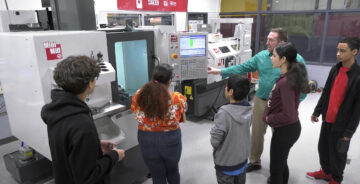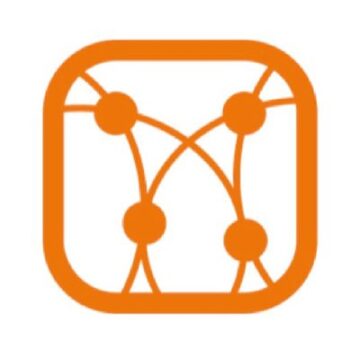NAF career academies are structured as small, focused learning communities that fit within and enhance traditional high school settings. NAF brings education, business, and community leaders together to transform the high school experience for students, with a focus on college and career readiness.
NAF career academies are designed so that students have learning experiences that are personalized and connected to their career interests. Students can choose from multiple career pathways in thriving industries as the basis of their program of study and can earn NAFTrack Certification. NAFTrack is a recognition of a student’s experience, career planning journey, and skill mastery as validated by local employer partners.
To support pathways toward college and career readiness, NAF provides rigorous, career-focused curricula using project-based learning that incorporates current industry standards and practices. This allows teachers to expand the curriculum by exposing students to career-focused content in real-world contexts—bringing the workplace to the classroom. NAF provides experiential learning opportunities that expand classroom boundaries by connecting students to both professionals and the workplace. As a result, students acquire the skills they need to be future-ready.
NAF has grown from one NAF Academy of Finance in New York City in 1980 to more than 600 academies across 35 states, plus DC, Puerto Rico, and the US Virgin Islands, focusing on growing industries including finance, hospitality and tourism, information technology, engineering, health sciences, and more.
What Makes This Model Innovative?
Relevance
Affirmation of Self & Others
Connection & Community
Goals
NAF career academies are designed to help students develop future-ready skills as a part of its outcomes-driven, work-based learning approach. These six skills were selected in collaboration with experts with insight about how to position students for success in the world of work today and tomorrow. NAF Future-Ready Skills
Collaboration
Students encourage the ideas and contributions of others, leveraging individual strengths in authentic, collaborative activities. They are mindful when providing feedback and can help navigate disagreements to achieve a common goal.
Communication
Students develop communication skills to effectively share ideas and opinions with those they engage with and organize information so that it serves the purpose of the audience.
Problem-Solving
Students identify and solve problems by considering different factors, causes, and perspectives. They generate potential solutions to a problem through analysis, evaluation, and iteration.
Initiative & Self-Direction
Students demonstrate awareness of their abilities and performance and seek knowledge and information proactively whenever needed. They can work independently and are adaptable, confident that their voice and opinion can be of value to others.
Planning for Success
Students set and prioritize goals and apply their knowledge and time management skills to successfully complete their work.
Social Awareness
Students demonstrate integrity and situational ethics, recognizing the consequences of their actions. They are able to balance their own needs with those of others and consider diverse emotional and cultural factors. Students are passionate about giving back and strive to become thoughtful stewards of their communities.
Experience

The NAF career academies design uses both project-based learning and work-based learning to support students for college, career, and future success. The interdisciplinary projects students design and develop in the classroom are connected to and complement the program of study that students follow. New to NAF Student Orientation
Each part of the NAF design seeks to put students in contexts where they can identify their future aspirations, find industry support, and develop their skills and self-confidence. Career pathways supported by NAF include but are not limited to:
- Engineering: NAF’s engineering curricula inspire learners to imagine innovative solutions to real-world issues. NAF’s engineering academies implement third-party curricula by Project Lead the Way, STEM 101, and Paxton/Patterson.
- Finance: NAF’s finance curricula align with competencies identified by professional organizations, industry partners, and postsecondary institutions as essential for success in college and careers in the financial sector.
- Information Technology: NAF’s information technology (IT) curricula enable learners to explore various aspects of IT including coding, computer systems, graphic design, and web development. Career Academy – Information Technology
- Health Sciences: NAF’s health sciences curricula provide a rigorous and comprehensive program of study designed to prepare learners with the content knowledge and transferable competencies necessary for success in college and careers in health care.
- Hospitality and Tourism: NAF’s hospitality and tourism curricula expose learners to the essential components of the industry, including foundational principles, customer service, event planning, and marketing with a global perspective on the geography and sustainability of tourism.
NAF partners with districts to support additional career pathways as determined by labor market projections, industry trends, and local workforce needs.
Project-based learning (PBL) is a key part of the NAF student learning experience inside of classrooms. In NAF academies, typically two or three core classes integrate course content to support projects designed and developed around real-world problems within the specific career pathways. Teachers collaborate with career pathway industry professionals so that students are working on projects that emphasize the application and relevance of core knowledge in a professional context.
As the NAF approach to instruction, PBL translates into the development of future-ready competencies and essential workplace skills for students. Whether they are using interdisciplinary perspectives to solve problems, interviewing experts, synthesizing collective insights, or creating presentations to share projects, students engaged in PBL must be active. Across multiple projects, students grow in their ability to communicate, collaborate, organize, and problem-solve with both peers and adults. PBL also helps students develop the agency, self-awareness, and growth mindset to be future-ready. As a part of their accomplishments, students gain confidence in the fact that they have engaged in projects that have value in the larger world. This answers a question often asked by teenagers, “Why do I need to learn this?”
 Work-based learning is an educational approach designed to help students connect what they learn in the classroom with what is expected outside of it in the workplace. NAF academies partner with industry professionals to structure work-based learning in three phases that connect classroom work with real-world applications. Students engage in work-based learning through career awareness, career exploration, and career preparation activities. NAF’s Approach to Work-Based Learning NAF Work-Based Learning
Work-based learning is an educational approach designed to help students connect what they learn in the classroom with what is expected outside of it in the workplace. NAF academies partner with industry professionals to structure work-based learning in three phases that connect classroom work with real-world applications. Students engage in work-based learning through career awareness, career exploration, and career preparation activities. NAF’s Approach to Work-Based Learning NAF Work-Based Learning
- Career Awareness: Students build career awareness and begin to identify areas of work interest through observation and inquiry. They have ongoing interactions with professionals in workplace settings through a variety of experiences—guest speakers, worksite tours, and career fairs that expand their sense of what is possible in their lives.
- Career Exploration: Students gain a deeper understanding of the workplace by applying knowledge and playing a more active role in their experiences. Students discover careers of interest, develop professional skills, and make meaningful connections with professionals during informational interviews, job shadowing, resume coaching, mock interviews, mentorship, and skill-building workshops.
- Career Preparation: Students apply what they have learned in practical experiences that have consequences beyond the classroom and can be evaluated by industry professionals. They prepare for professional experiences—internships, clinical work, mentored industry projects, and apprenticeships—with guidance from their teacher and reflect on their experience after participation. Prepare for Internships Myth vs. Fact: High School Internships
Work-based learning helps students clarify career aspirations, develop future-ready skills, and build professional connections.
Supporting Structures
The NAF career academy model has the flexibility to support students across many contexts. An annual assessment process exists for schools that want to be NAF network members. In general, fidelity to key NAF processes and structures is essential to success.
Schools seeking to become NAF career academies must offer a program of study that is aligned with work-based learning to help students earn NAFTrack Certification.
NAF partners with schools to provide rigorous, career-themed curricula that align with local workforce needs. These curricula incorporate current industry standards and practices, project-based learning, work-based learning extensions, and performance-based assessments. Schools must develop this type of curricula to adopt the NAF model with fidelity.
To become a NAF career academy, schools must take the steps necessary to offer NAFTrack Certification. This certification signifies that the student has reached NAF’s standards of future-readiness and represents a student’s achievement through participation in a career-connected program of study, completion of multiple work-based learning opportunities, and experience with professional feedback and mentorship from industry partners.
Using cohorts to build a positive social-emotional foundation for learning is an integral part of the NAF student experience.
To create small learning communities within NAF academies, students are grouped together in cohorts. This helps students have a more personalized experience where they can access any support they may need. Beyond this, cohorts give students more opportunities to engage in collaborative experiences that strengthen their professional skills and personal networks.
Teachers at NAF career academies are committed to supporting students both inside and outside of the classroom.
NAF teachers, advisory board members, mentors, and staff build relational trust with students as a foundation for the path toward graduation and postsecondary goals. NAF students report that their teachers make an effort to get to know them as a person and they feel that they are treated fairly, regardless of race or ethnicity. Students also report that most teachers teach in a way that relates to their cultures and experiences.
Outside of the classroom, teachers work with industry professionals to develop curriculum and organize work-based learning activities, including internship opportunities.
NAF career academies are required to establish an Advisory Board to drive engagement with industry professionals that supports student development and the workforce goals of the local community.
NAF Advisory Boards provide an essential bridge between schools and the workplace. They are the foundation of the partnerships that NAF academies use to drive work-based learning. People from business, government, and nonprofit organizations volunteer on local advisory boards to play an active role in developing their future workforce by shaping talent in high school.
Advisory board members collaborate with educators to inform curricula and help organize work-based learning activities. They also serve as mentors who build relationships with students and serve as positive role models.
Open enrollment is a critical element for schools adopting the NAF model because improving outcomes for all students is essential to its mission.
Schools that want to become NAF academies must maintain an open enrollment admission policy. While the NAF design is effective for students of all backgrounds and capabilities when implemented with fidelity, districts and communities facing historical and systemic challenges are prioritized for partnerships. This is exemplified by the fact that NAF enrolls students of color and students in free-and-reduced-price lunch programs at a significantly higher rate than the national average.
NAF career academies must undergo an annual assessment that allows them to review their progress against NAF’s standards and engage in a systemic evaluation process to validate the quality of their program of study.
The annual academy assessment helps schools implement the NAF design with high fidelity and also determine the academy’s quality level (i.e., under review, member, certified, model, and distinguished). They also ensure that academies are engaged in high-quality personalization of learning, increased engagement with employers, and increased student exposure to work-based learning experiences. The emphasis on continuous improvement is reflected in student outcomes that are assessed annually. NAF Academy Standards
Schools seeking to become NAF career academies must offer a program of study that is aligned with work-based learning to help students earn NAFTrack Certification.
NAF partners with schools to provide rigorous, career-themed curricula that align with local workforce needs. These curricula incorporate current industry standards and practices, project-based learning, work-based learning extensions, and performance-based assessments. Schools must develop this type of curricula to adopt the NAF model with fidelity.
To become a NAF career academy, schools must take the steps necessary to offer NAFTrack Certification. This certification signifies that the student has reached NAF’s standards of future-readiness and represents a student’s achievement through participation in a career-connected program of study, completion of multiple work-based learning opportunities, and experience with professional feedback and mentorship from industry partners.
Using cohorts to build a positive social-emotional foundation for learning is an integral part of the NAF student experience.
To create small learning communities within NAF academies, students are grouped together in cohorts. This helps students have a more personalized experience where they can access any support they may need. Beyond this, cohorts give students more opportunities to engage in collaborative experiences that strengthen their professional skills and personal networks.
Teachers at NAF career academies are committed to supporting students both inside and outside of the classroom.
NAF teachers, advisory board members, mentors, and staff build relational trust with students as a foundation for the path toward graduation and postsecondary goals. NAF students report that their teachers make an effort to get to know them as a person and they feel that they are treated fairly, regardless of race or ethnicity. Students also report that most teachers teach in a way that relates to their cultures and experiences.
Outside of the classroom, teachers work with industry professionals to develop curriculum and organize work-based learning activities, including internship opportunities.
NAF career academies are required to establish an Advisory Board to drive engagement with industry professionals that supports student development and the workforce goals of the local community.
NAF Advisory Boards provide an essential bridge between schools and the workplace. They are the foundation of the partnerships that NAF academies use to drive work-based learning. People from business, government, and nonprofit organizations volunteer on local advisory boards to play an active role in developing their future workforce by shaping talent in high school.
Advisory board members collaborate with educators to inform curricula and help organize work-based learning activities. They also serve as mentors who build relationships with students and serve as positive role models.
Open enrollment is a critical element for schools adopting the NAF model because improving outcomes for all students is essential to its mission.
Schools that want to become NAF academies must maintain an open enrollment admission policy. While the NAF design is effective for students of all backgrounds and capabilities when implemented with fidelity, districts and communities facing historical and systemic challenges are prioritized for partnerships. This is exemplified by the fact that NAF enrolls students of color and students in free-and-reduced-price lunch programs at a significantly higher rate than the national average.
NAF career academies must undergo an annual assessment that allows them to review their progress against NAF’s standards and engage in a systemic evaluation process to validate the quality of their program of study.
The annual academy assessment helps schools implement the NAF design with high fidelity and also determine the academy’s quality level (i.e., under review, member, certified, model, and distinguished). They also ensure that academies are engaged in high-quality personalization of learning, increased engagement with employers, and increased student exposure to work-based learning experiences. The emphasis on continuous improvement is reflected in student outcomes that are assessed annually. NAF Academy Standards
Supports Offered
NAF offers the following supports to help you implement their approach.
NAF Academy Support Hub (ASH)
Free
Resources are a crucial element of the NAF design. The Academy Support Hub (ASH) provides curriculum, work-based learning, and advisory board resources, and a variety of other information about NAF practices and processes.
NAF Network Membership
Cost Associated
Various professional development opportunities and online tools and resources are available to schools that join the NAF Network.
NAF Next is an annual conference focused on key strategies to improve academy quality, work-based learning, and student and employer engagement efforts. Enhancing Personalized Learning Environments is an online micro-credential course developed in collaboration with Digital Promise.
NAF Year of Planning
Cost Associated
The Year of Planning (YOP) program is a structured, developmental process in which NAF academy portfolio managers provide guided technical assistance to plan and align resources for the yearlong implementation of a NAF academy. The YOP program establishes a sustainable foundation that ensures the success of a NAF academy to prepare college- and career-ready students.
Reach
NAF supports schools that adopt their full model design as well as those who adopt individual career academies as a part of their programs. Beyond its direct work with current students, NAF actively engages members of its broader alumni network.
Impact
NAF has demonstrated it is effective at improving postsecondary outcomes for students. NAF Four-Year Graduation Study Infographic NAF Impact Report 2022
NAF students across different demographics are more likely to graduate on time than their non-NAF counterparts. A 2017 study found:
- NAF students were 6 percentage points more likely to graduate on time, a total of 1,695 students.
- NAF students considered “at risk” were 10 percentage points more likely to graduate on time.
- Male NAF students were 3.3 percentage points more likely to graduate on time.
- Hispanic NAF students were 4.2 percentage points more likely to graduate on time.
- NAF students who are multilingual learners were 7.9 percentage points more likely to graduate on time.
- NAF students who qualify for free or reduced-price lunch programs were 4.6 percentage points more likely to graduate on time.
NAF graduates were prepared for college and career. In the 2021-2022 school year:
- 99% of seniors graduated.
- 39% of seniors had an internship.
- 87% of graduates were college-bound.
- 11% of graduates joined the workforce.



